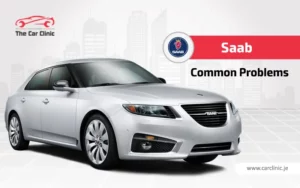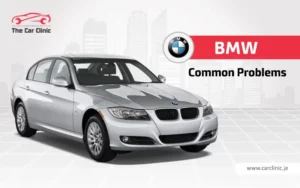Mercedes-Benz Common Problems
- Engine Mounts Failure;
- Low Brake Pressure;
- Air Suspension Failure;
- Oil Leaks and a lot more!
Do your Mercedes-Benz in need of service or repairs, The Car Clinic is the solution.
1) Engine Mounts Failure
Mercedes-Benz automobiles’ engine mounts have a history of failing, leading to various issues. These mounts are in charge of mounting the engine to the car’s frame and minimizing noise and vibration that enters the cabin.
In fact…
When the mounts fail, the engine may move about excessively, resulting in many problems, including vibration, misalignment of the engine and transmission, and damage to other parts. Excessive engine movement, banging or knocking noises, and an obvious vibration increase are typical symptoms of a malfunctioning engine mount.
It’s advised…
The engine mounts must be constantly inspected and changed immediately if any problems are found because they can cause serious harm if ignored.
2) Low Brake Pressure
A typical problem with Mercedes-Benz automobiles is insufficient brake pressure. Problems with the brake booster, a leaking braking system, or simply worn-out brake pads are a few of the probable reasons for this.
However…
A spongy or soft brake pedal increased stopping distance, and the need to apply more force than usual to the brake pedal could all be signs of low brake pressure. The driver’s and passengers’ safety can be jeopardized if low brake pressure is ignored.
As a result…
If you observe any problems with your brakes, you should have a qualified mechanic look at them immediately.
3) Air Suspension Failure
Vehicles manufactured by Mercedes-Benz that use air suspension are susceptible to suspension system failure, resulting in a shaky ride or a complete loss of control.
Turns out…
Problems with the airbags’ inflated ability could result from leaks or faulty air compressors. Aside from the discomfort it causes passengers, this issue can also damage the vehicle’s tires and undercarriage.
However…
Repairs for air suspension systems can be costly, and regular maintenance is crucial to prevent failures from occurring.
It’s recommended to…
Mercedes-Benz owners who experienced issues with their air suspension system should bring their vehicles to a certified mechanic for diagnosis and repair.
4) Rusts Easily & Rapidly
Mercedes-Benz vehicles are known for their durability and longevity. However, one issue that some owners have experienced is rapid rusting.
Turns out…
Exposure to salt, such as that found on winter roadways, is a common cause of this problem because it rapidly corrodes metal. Paint flaws or a compromised protective coating are also possible root causes.
Surprisingly…
Rust is a danger that can seriously harm the vehicle’s structure and jeopardize its safety. Wash your car frequently, keep it out of salt, and replace any chips in the paint or coating right once to prevent rusting.
Our recommendation…
Repairing or replacing the corroded parts by a professional mechanic is essential if you see rapid corrosion in your vehicle.
5) Oil Leaks
Despite Mercedes-Benz vehicles’ well-known performance and luxury, oil leaks may be irritating and expensive for owners.
It’s observed…
The oil pan or valve cover gasket and the front/rear crankshaft seals are just a few places on the engine where oil leaks might happen.
Turns out…
These seals may deteriorate, crack, or loosen over time, causing oil leaks. Low oil levels, decreased engine performance, and engine damage can all be consequences of oil leaks.
In addition to these problems…
Oil leaks can also be dangerous because they make the road slick, which raises the possibility of accidents.
To stop any damage and maintain your safety while driving, having any oil leaks in your Mercedes-Benz inspected and fixed as soon as possible is crucial.
Seeking a garage for your Mercedes-Benz’s servicing or repairs in Jersey? We’re here to assist you.
6) Transmission Issues
Transmission Fluid Leaks: One of the most common issues is transmission fluid leaks. Leaks can occur from various points in the transmission system, including the seals, gaskets, or the transmission pan. Low transmission fluid levels can lead to overheating and damage.
Jerky Shifting: Some Mercedes-Benz models with automatic transmissions have been known to exhibit jerky or harsh shifting between gears. This can be caused by problems with the transmission control module, software issues, or sensor malfunctions.
Delayed Shifting: Delayed shifting, especially when shifting into gear or downshifting, can occur due to issues with the valve body or the conductor plate inside the transmission.
Transmission Slipping: Transmission slipping is characterized by a loss of power or RPM fluctuations when accelerating. This can be caused by worn clutches, a faulty torque converter, or other internal transmission components.
Electronic Control Unit (ECU) Problems: Problems with the ECU or TCU (Transmission Control Unit) can result in shifting problems or other transmission-related issues. Sometimes, reprogramming or updating the software can resolve these issues.
Stuck in Gear: Some Mercedes-Benz vehicles may experience problems where the transmission gets stuck in one gear, typically “limp home” mode. This is often a protective measure to prevent further damage when the transmission encounters a fault.
Torque Converter Issues: The torque converter can develop problems, such as lock-up clutch failures or fluid coupling issues, leading to poor performance and fuel economy.
Mechanical Failures: In rare cases, there can be internal mechanical failures within the transmission, such as damaged gears, bearings, or the transmission pump. These issues are typically more severe and may require a transmission rebuild or replacement.
However…
A delay or reluctance when changing gears is one of the most frequent issues with Mercedes-Benz transmissions. Numerous things, such as worn-out gears, fluid leaks, or problematic sensors, can contribute to this.
Furthermore…
Another problem that some Mercedes-Benz owners could run into is a transmission that shifts poorly or slips. Other factors, such as low fluid levels or worn-out transmission parts, may also contribute to this.
It’s recommended…
Follow your Mercedes-Benz’s suggested maintenance plan closely to prevent these difficulties, and have any potential transmission faults quickly identified and fixed.
7) Brakes Squilling and Grinding
This problem can be caused by worn brake pads, rotor damage, or issues with the brake calipers and should be addressed promptly to avoid further damage to the braking system.
8) Slipping & Grinding Clutch – Manuel Cars Only
This problem is typically caused by worn clutch discs or pressure plates and can cause the transmission to slip or make grinding noises when shifting gears.
9) Mercedes-Benz Dashboard Indicator Lights
These lights indicate potential issues with various systems in the vehicle and should be promptly addressed to avoid potential damage or safety hazards.
10) Mercedes-Benz Power Steering Leaks
Leaks in the power steering system can lead to decreased steering responsiveness or failure and should be fixed immediately to avoid potential safety risks.
11) Air Conditioner System Leaks
Leaks in the AC system can cause decreased cooling efficiency or failure and should be repaired to ensure proper system functioning.
12) Mercedes-Benz Poor Acceleration
This problem may be caused by fuel, air intake, or transmission issues and should be diagnosed and repaired promptly to avoid further damage.
13) Mercedes-Benz Knocking Suspension
This problem may be caused by worn suspension components or issues with the steering system and should be diagnosed and repaired to avoid potential safety hazards.
14) Mercedes-Benz Overheating & Cooling Fans Problems
These problems can be caused by issues with the radiator, cooling fans, or thermostat and should be addressed to avoid potential engine damage or overheating.
15) Mercedes-Benz Oil Clogs and Leaks
Oil leaks or clogs can lead to engine damage or failure and should be repaired promptly to avoid costly repairs.
16) Mercedes-Benz Car Battery
A failing battery can cause starting issues or failure of various electrical systems and should be replaced promptly to avoid potential safety hazards or further damage to the vehicle.
17) Transmission Problems
Transmission issues can cause problems with shifting gears or loss of power and should be diagnosed and repaired to avoid further damage to the vehicle.
Conclusion: Mercedes-Benz Common Problems
If you have an Mercedes-Benz and need service or repairs, The Car Clinic is ready to help.











